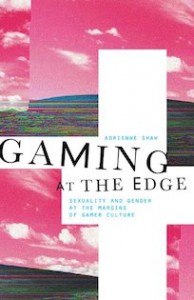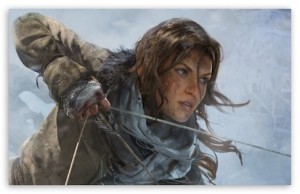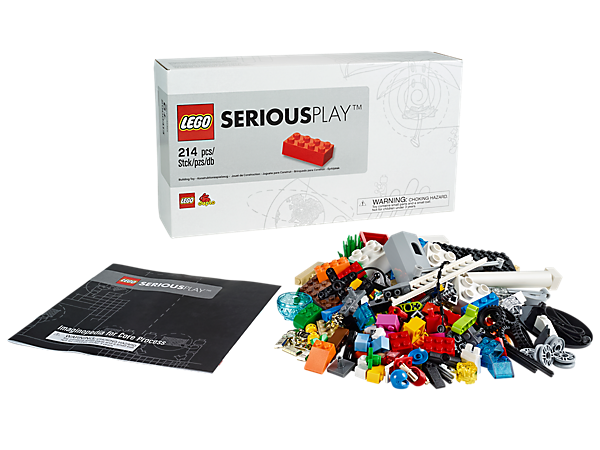 This past week, I’ve been catching up on reading Adrienne Shaw’s book Gaming at the Edge: Sexuality and Gender at the Margins of Gamer Culture, and a series of questions that Shaw asks in the second chapter (entitled “Does Anyone Really Identify with Lara Croft?: Unpacking Identification in Video Games”) has struck me:
This past week, I’ve been catching up on reading Adrienne Shaw’s book Gaming at the Edge: Sexuality and Gender at the Margins of Gamer Culture, and a series of questions that Shaw asks in the second chapter (entitled “Does Anyone Really Identify with Lara Croft?: Unpacking Identification in Video Games”) has struck me:
When we say we really identify with the main character in a book, the sidekick in a movie, or a particular character in a television show, what does that word mean? Do we mean the same thing when we say that we identify with our avatar in a video game?
Indeed, I have found myself asking similar questions lately—what does it really mean to identify with a character? How does such identification speak to identity and identity formation? How does the idea of representation inform the way we think about identification—and vice versa? How might the way we think about the above questions help us to consider how and why representation comes to matter, especially when we think about the state of representation in video games, as well as the current manner in which the gaming community seems to be discussing it? And does any of the above function differently in video games and gaming culture than it does for other media forms?
While I don’t feel fully able to tackle all these questions to the extent they deserve in the space of a single blog post (it takes Shaw a whole book to do so, and even she doesn’t have all the answers), I do want to stress the importance of a continued examination of them. And, to be sure, Shaw’s book seems to function as an appropriate starting-off point. For instance, Shaw argues, among other things, that, based on conclusions she draws from a series of interviews she conducts, we identify with characters that allow us to see ourselves reflected in the narrative world in which we have immersed ourselves. Such identification, she continues, speaks to the manner in which the representation of more diverse characters and identities in games allows us to experience, as Shaw puts it, “what would be and who can be possible.” Thus, video games, like most (if not all) other forms of media, allow us to conceive of the other worlds that may be possible.
And it would seem that narrative plays a key role in all this. In fact, in the course of Shaw’s study, she finds that, for most of the people she interviewed, “narrative was identified as the key ingredient in helping players identify with their on-screen proxy.” An effective, nuanced, well-functioning narrative, it should go without saying, allows us to more fully identify with the world that is being created, and more diverse representation within such narratives serves to expand our engagement with such narratives in more multifaceted ways.
 In light of this, I feel I should point out that, last week, I wrote about the narrative potential of video games; I’d like to now extend that line of thinking here, for Shaw’s study seems to underscore just how important that narrative potential may be. Again, video games tell stories—whether they’re stories about a witcher searching for his kin or a woman who raids tombs—and it would seem that more fleshed-out video game narratives should allow for more diverse representation and deeper identification.
In light of this, I feel I should point out that, last week, I wrote about the narrative potential of video games; I’d like to now extend that line of thinking here, for Shaw’s study seems to underscore just how important that narrative potential may be. Again, video games tell stories—whether they’re stories about a witcher searching for his kin or a woman who raids tombs—and it would seem that more fleshed-out video game narratives should allow for more diverse representation and deeper identification.
But this doesn’t necessarily seem to be happening just yet. Indeed, Shaw finds that those she interviews identify less with the video game characters they play than they do with characters in other media forms. And I wonder why exactly that is. I’m sure that several factors converge to make this the case, including the fact that we interact with a video game differently than we do with other texts, as well as the fact that we perceive characters that we play differently than those we read or watch (our activity in relation to such a character is, thus, different). But perhaps we might also consider the idea that video game narratives function differently than the narratives of other media forms as well, and many of the narratives that we’ve seen so far could use some improvement—due to, for instance, clunky cut scenes, one dimensional characters, or stiff dialogue. By improving the narrative aspects of games (alongside the advances being made in technology, mechanics, and gameplay), video games might allow those who play them to engage more fully with the world in which they are immersed.
I hope it’s obvious that I’m not saying video games suck—because I’m not (and Shaw isn’t either). The desire for improvement, rather, speaks to the fact that I find an already engaging genre to have the potential to do more. It is this hope for more that causes those of us who write critically about representation in video games to do so. But who is responsible for enacting the change that we write about? Is better representation the responsibility of the critics? The players? The game-makers?
 Obviously all of the above, for in a world in which critics like Tauriq Moosa are harassed for discussing issues of the representation of race and in a world in which games like Batman: Arkham Knight rely on violence against women as a narrative tool for the furthering of the main (male) character’s motivation and storyline, we can all be doing better. It’s not solely up to the critics to seek change with their words or the players to do so with their money—the placement of the responsibility for representation on such groups simply serves to perpetuate the producer/consumer binary (and, in the case of the player, places far too much neoliberal importance on the idea that money and consumerism are the ideal means of expressing ideological beliefs). It’s up to all of us to engage in consistent dialogue concerning the state of representation in games. Because what is at stake is our ability to tell better stories and to tell ones that speak to a larger, more diverse audience.
Obviously all of the above, for in a world in which critics like Tauriq Moosa are harassed for discussing issues of the representation of race and in a world in which games like Batman: Arkham Knight rely on violence against women as a narrative tool for the furthering of the main (male) character’s motivation and storyline, we can all be doing better. It’s not solely up to the critics to seek change with their words or the players to do so with their money—the placement of the responsibility for representation on such groups simply serves to perpetuate the producer/consumer binary (and, in the case of the player, places far too much neoliberal importance on the idea that money and consumerism are the ideal means of expressing ideological beliefs). It’s up to all of us to engage in consistent dialogue concerning the state of representation in games. Because what is at stake is our ability to tell better stories and to tell ones that speak to a larger, more diverse audience.
It’s not just about diversity for diversity’s sake, which is an oversimplification of why it is that representation matters, and I think those of us writing about diversity and representation must make sure to take care in the way we discuss such matters. Rather, to return to Shaw’s phrasing, it’s about embracing the diversity of experience in order to “empower us to move beyond arguments that focus heavily on specific identifiers and types of identification in making sense of why representation is important.”





6 thoughts on “Why Representation Matters: On Identification and Diversity in Video Games”
That sounds like a great book, and you break down the issue very well. Does Shaw get into wishful identification at all? The type you discuss sounds like identification based on similarities — we see ourselves in those characters with which we identify. Wishful identification would be when we see something in a character that we would like to emulate — like that character is a model for us in some way. I have looked at both (years ago now!) in my research, so I am curious to know if Shaw has done so.
The book has definitely been some great summer reading! As for wishful identification–that’s a really great question. Shaw seems to touch on it a bit, specifically in regards to the fact that some of the people she interviewed said they connect to characters whom they wish they could be; one of the interviewees, for example, says, “I sometimes wish I could be that FBI agent saving the day.” In touching on such aspects, Shaw also unpacks the distinctions between, among other things, identification and escapism, identification “with” a character and identification “as” a character, and identification and disidentification. Lots of stuff going on here, which makes it a fascinating read. (Also, your research sounds cool!)
Nice! I was going to ask if disidentification was something Shaw discussed because it was an integral part of a paper I wrote a few years ago and the basis for my current thesis. I might have to pick this book up when I have the spare cash and see if I can incorporate it into my research. .
Yeah, I found her discussion of disidentification to be helpful! And she also works to unpack whether or not identification is even important to the people she interviews, as well as what that might mean for the way we engage with video games and for the way we think about representation in them. Fascinating stuff! (Side note: I’m also finding her bibliography alone to be extensive…a nice place to go for further reading on all this!) Happy reading!
I wrote and presented a paper on identification, idealization, and disidentification when we play video games! I think I prefer the sound of wishful identification than idealization, as it sounds more like its on the player’s end.
This is perfect. I’m teaching a class next year on identity formation through narrative, and this is going to be required reading. Thanks, Bianca!